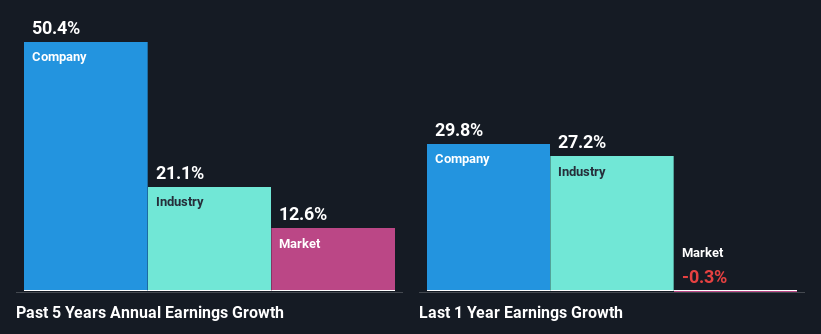Stock Analysis
Could The Market Be Wrong About Marks and Spencer Group plc (LON:MKS) Given Its Attractive Financial Prospects?

With its stock down 3.3% over the past week, it is easy to disregard Marks and Spencer Group (LON:MKS). But if you pay close attention, you might gather that its strong financials could mean that the stock could potentially see an increase in value in the long-term, given how markets usually reward companies with good financial health. Specifically, we decided to study Marks and Spencer Group's ROE in this article.
ROE or return on equity is a useful tool to assess how effectively a company can generate returns on the investment it received from its shareholders. Simply put, it is used to assess the profitability of a company in relation to its equity capital.
View our latest analysis for Marks and Spencer Group
How Do You Calculate Return On Equity?
Return on equity can be calculated by using the formula:
Return on Equity = Net Profit (from continuing operations) ÷ Shareholders' Equity
So, based on the above formula, the ROE for Marks and Spencer Group is:
14% = UK£405m ÷ UK£2.8b (Based on the trailing twelve months to September 2023).
The 'return' is the profit over the last twelve months. So, this means that for every £1 of its shareholder's investments, the company generates a profit of £0.14.
What Has ROE Got To Do With Earnings Growth?
We have already established that ROE serves as an efficient profit-generating gauge for a company's future earnings. We now need to evaluate how much profit the company reinvests or "retains" for future growth which then gives us an idea about the growth potential of the company. Assuming all else is equal, companies that have both a higher return on equity and higher profit retention are usually the ones that have a higher growth rate when compared to companies that don't have the same features.
Marks and Spencer Group's Earnings Growth And 14% ROE
To begin with, Marks and Spencer Group seems to have a respectable ROE. Even so, when compared with the average industry ROE of 19%, we aren't very excited. That being the case, the significant five-year 50% net income growth reported by Marks and Spencer Group comes as a pleasant surprise. Therefore, there could be other causes behind this growth. For example, it is possible that the company's management has made some good strategic decisions, or that the company has a low payout ratio. Bear in mind, the company does have a respectable ROE. It is just that the industry ROE is higher. So this certainly also provides some context to the high earnings growth seen by the company.
We then compared Marks and Spencer Group's net income growth with the industry and we're pleased to see that the company's growth figure is higher when compared with the industry which has a growth rate of 21% in the same 5-year period.

The basis for attaching value to a company is, to a great extent, tied to its earnings growth. The investor should try to establish if the expected growth or decline in earnings, whichever the case may be, is priced in. By doing so, they will have an idea if the stock is headed into clear blue waters or if swampy waters await. Is MKS fairly valued? This infographic on the company's intrinsic value has everything you need to know.
Is Marks and Spencer Group Using Its Retained Earnings Effectively?
Marks and Spencer Group has a really low three-year median payout ratio of 2.6%, meaning that it has the remaining 97% left over to reinvest into its business. So it seems like the management is reinvesting profits heavily to grow its business and this reflects in its earnings growth number.
Additionally, Marks and Spencer Group has paid dividends over a period of at least ten years which means that the company is pretty serious about sharing its profits with shareholders. Looking at the current analyst consensus data, we can see that the company's future payout ratio is expected to rise to 31% over the next three years. However, the company's ROE is not expected to change by much despite the higher expected payout ratio.
Summary
Overall, we are quite pleased with Marks and Spencer Group's performance. Specifically, we like that it has been reinvesting a high portion of its profits at a moderate rate of return, resulting in earnings expansion. With that said, the latest industry analyst forecasts reveal that the company's earnings growth is expected to slow down. To know more about the company's future earnings growth forecasts take a look at this free report on analyst forecasts for the company to find out more.
Valuation is complex, but we're helping make it simple.
Find out whether Marks and Spencer Group is potentially over or undervalued by checking out our comprehensive analysis, which includes fair value estimates, risks and warnings, dividends, insider transactions and financial health.
View the Free AnalysisHave feedback on this article? Concerned about the content? Get in touch with us directly. Alternatively, email editorial-team (at) simplywallst.com.
This article by Simply Wall St is general in nature. We provide commentary based on historical data and analyst forecasts only using an unbiased methodology and our articles are not intended to be financial advice. It does not constitute a recommendation to buy or sell any stock, and does not take account of your objectives, or your financial situation. We aim to bring you long-term focused analysis driven by fundamental data. Note that our analysis may not factor in the latest price-sensitive company announcements or qualitative material. Simply Wall St has no position in any stocks mentioned.
About LSE:MKS
Marks and Spencer Group
Marks and Spencer Group plc operates various retail stores.
Undervalued with proven track record.

